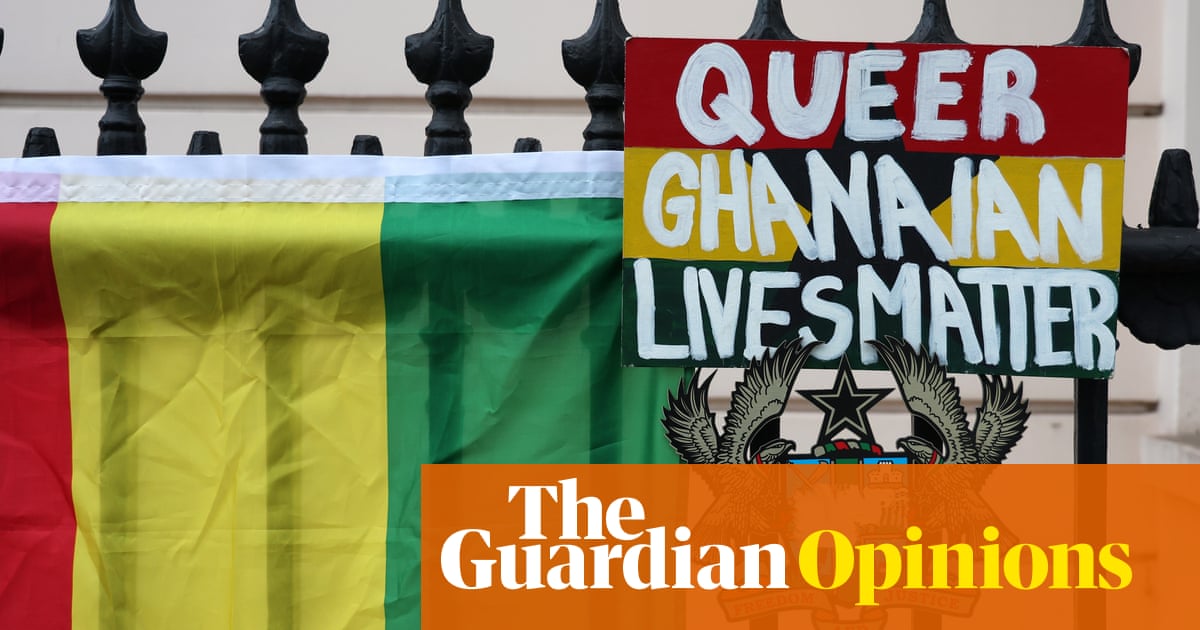In the past 10 years, Ghana has transitioned from indifference towards LGBTQ+ people to outright hostility. The human sexual rights and family values bill doubles down on the banning of gay sex and prohibits the promotion or outward support of LGBTQ+ individuals.
To the dismay of queer people and their allies in Ghana and across the world, this bill has been approved by parliament and is waiting to be signed into law by President Nana Akufo-Addo.
The debate around the promotion of queerness – that LGBTQ+ people seek to “convert” heterosexual and cisgender people to disrupt the average Ghanaian’s way of life – is more than a dead horse at this juncture. Apparently, the institution of heteronormativity, adored by politicians and religious zealots alike, is so fragile that the mere sight of queer people unashamedly existing can cause it to collapse.
There are so many scholarly readings of scripture … why is it that this government only favours the most extreme of these views?
When I think of the rot that eats away at the roots of our society, a trans woman wearing a dress or two men holding hands does not spring to mind. Instead, it’s the sheer number of women and girls who are endlessly harassed: at home, at schools and universities, at work, in places of worship, at the market.
When I think of rot, I recall the vile misogyny in school and the number of girls I knew who were terrified to enter the classroom because of this.
These young men revile the mere mention of queerness, and recite by rote holy scriptures, brandishing religion as a bludgeoning instrument against us so-called sexual deviants.
Then, in the same breath, they will endlessly discuss their own sexuality, objectifying and sexualising women and girls, engaging in flippant talk of assaulting their future wives.
This, of course, is perceived as completely normal behaviour: men being men, roughhousing, messing about. When boiled down, men enthusiastically express their sexuality to a welcoming heterosexual audience. So how is it that queer people being visible in Ghanaian society is not only different, but unacceptably so?
Now, I once again pose this question with the following limitation: do not invoke religion. As a multi-ethnic, multi-faith nation with a large variety of denominations and interpretations of those beliefs, it is impossible to fairly and representatively legislate using religion as the principal driving force.
There are so many scholarly readings of scripture that differ wildly in their acceptance of many issues including queerness, gender variance and the judgment of such people. Why is it that this government only seems to favour the most violent and extreme of these views?
I have lived in four different countries – three in sub-Saharan Africa – and have wanted to settle down in Ghana for some time. But as a single, gay trans man, my life would be in danger for reasons that go beyond this new law.
Before the erasure and dismantling of our culture, we did not hold western notions of binary gender
Police raids on LGBTQ+ events and spaces have drastically increased since the bill was first proposed. The most relevant example of this was the forced closure of Alex Kofi Donkor’s LGBT+ Rights Ghana centre in Accra.
Worse still are the homophobic vigilantes who lure queer people, predominantly gay men, via dating apps in order to humiliate, assault or even kill them. This law only serves to further empower these sadistic individuals.
One of the most hurtful and frustrating aspects of this ongoing legal, social and moral issue is the notion that queerness is inherently un-African. Our former president John Agyekum Kuffour claimed queerness was against our culture and religion, and even defies nature.
To claim that homosexuality defies nature is ridiculous, considering the countless examples of homosexuality elsewhere in the animal kingdom. To further insinuate that LGBTQ+ identities are un-Ghanaian is ahistorical. This viewpoint fails to account for the sheer destruction enacted upon us, our cultures and traditions due to settler colonialism and chattel slavery.
When the majority of Ghana was Christianised, many tribal traditions and belief systems were deemed sinful, devil-worship or witchcraft. Before the systematic erasure and dismantling of our culture, we did not hold western notions of binary gender or gender roles. In Fante culture, it is believed that sexual attraction is determined by the weight of one’s soul rather than gender or sex. Many tribes in Ghana are matrilineal and give women roles in leadership, war and governance.
Countless academics have dedicated years of research to recovering these lost values, and one only has to look for this information for a few minutes to discover it. It is ironic that the western erasure of queerness in Ghana is upheld in the name of resisting said western influences.
The uncomfortable reality is this: it is not queerness that is the western import, it is queerphobia.
Elliot Kwabena is an ambassador for Just Like Us, the LGBTQ+ young people’s charity.
∎